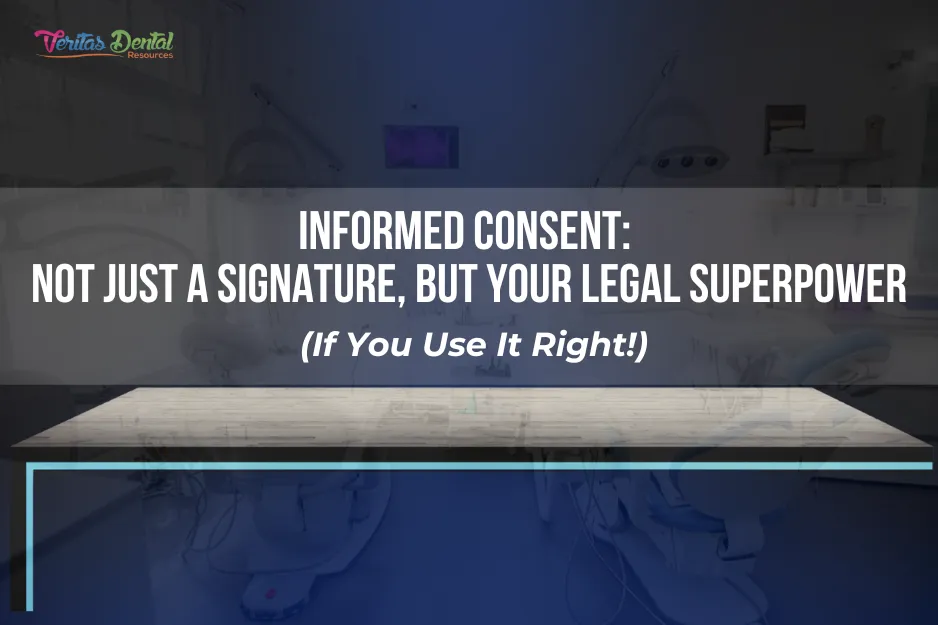
Informed Consent: Not Just a Signature, But Your Legal Superpower (If You Use It Right!)
Dentists, let’s talk about something that’s not exactly glamorous but is absolutely essential: informed consent. Think of it as the dental equivalent of a prenup—you don’t hope to use it in court, but you’ll be glad it’s there when things get messy.
What Is Informed Consent, Really?
Informed consent is more than just a patient scribbling their name on a clipboard while half-reading a laminated form. It’s a legal and ethical requirement that protects both the patient and you, the doctor. At its core, informed consent is about disclosure, understanding, and voluntary decision-making. It means your patient knows:
What you’re doing (e.g., that crown prep isn’t a free teeth whitening session),
Why you’re doing it (diagnosis and rationale),
What could go wrong (hello, litigation!),
What the alternatives are (including doing nothing at all), and
What it will cost (yep, that counts too!).
Why Dentists Get Sued Over This Stuff
Let’s be honest. Most lawsuits against dentists don’t happen because you did something technically wrong—they happen because the patient feels blindsided. That root canal that led to numbness? If they weren’t warned that it could happen, even if it was a rare side effect, you’re at risk.
Common consent-related blunders:
Assuming the front desk got the signature = NOT informed consent.
Rushing through explanations because you’re behind schedule = risky.
Using generic forms without procedure-specific risks = you might as well hand the plaintiff your malpractice policy.
What the Law Actually Says
Federal Law:
There’s no one-size-fits-all federal statute that governs informed consent in dentistry, but it stems from the constitutional right to bodily integrity and self-determination (see Schloendorff v. Society of New York Hospital, 1914). The Supreme Court has long held that a patient must give voluntary and informed permission for medical procedures.
Additionally, Medicare/Medicaid regulations (42 CFR § 482.13) require informed consent to be documented for participating providers—yes, that includes dentists participating in federally funded programs.
State Laws: They Vary Like Occlusal Guards
States are the primary regulators. A few examples:
California: Requires informed consent to be written and include risks, benefits, and alternatives (Cal. Bus. & Prof. Code § 1682).
Texas: Demands dentists use a "reasonable disclosure standard"—what a reasonable patient would want to know, not what you think is important (Tex. Civ. Prac. & Rem. Code § 74.101).
New York: Adds that consent must be obtained from a competent adult, and anything less is considered battery (NY Public Health Law § 2805-d).
Florida: Has a "presumption of informed consent" if you use state-approved forms (Fla. Stat. § 766.103), but beware—this doesn’t cover everything.
Pro tip: Look up your own state’s Dental Practice Act—it likely has specific language on informed consent.
How to Nail Informed Consent (and Not Get Sued)
Document EVERYTHING: If it’s not in writing, it didn’t happen.
Use procedure-specific forms: Especially for things like extractions, implants, root canals, or sedation.
Explain risks in plain English: “You may experience paresthesia” means nothing to a patient. “You may have a numb tongue for a long time, or permanently” gets the point across.
Check for comprehension: Ask them to explain it back. If they can’t, go over it again.
Use visuals: Diagrams, videos, models—whatever helps make it real.
Don’t delegate the conversation: Legally, the doctor must do the consenting, not the assistant or hygienist.
What About Kids and Adults With Diminished Capacity?
You can’t get legal consent from someone who can’t legally give it. That means:
Minors need a parent/guardian.
Elderly patients with dementia may require a legal power of attorney or conservator.
And for goodness' sake, keep a copy of the POA on file if someone is signing on behalf of the patient.
Real Talk: Informed Consent Is a Shield and a Sword
When done properly, informed consent can:
Reduce your liability risk by proving the patient was informed.
Improve trust and rapport with patients.
Protect you in board complaints, civil suits, and even criminal accusations.
But when done poorly, it’s like going to a malpractice knife fight with a floss pick.
Bonus: What to Include in Every Consent Form
Diagnosis or problem
Recommended procedure
Alternative options
Risks and potential complications
Expected benefits and prognosis
Cost estimate (if possible)
A statement that says “All my questions have been answered”
Signatures and dates from both the patient and provider
Interpreter acknowledgment if needed
Quick Recap
Informed consent is a legal requirement, not just a formality.
Federal and state laws both play a role—know your local regulations.
The doctor, not the team, must deliver the informed consent conversation.
Documentation saves you when memories fade and lawsuits flare.
Don’t rely on boilerplate—customize your consent process for each procedure.
Final Word
If you treat informed consent like a checklist item, you’re vulnerable. If you treat it like a powerful patient education tool, you’re protected—and more likely to build lasting patient relationships.
So, grab that form, sit down with your patient, and give them the gift of choice and clarity. Your future self (and your malpractice carrier) will thank you.
Benjamin Tuinei
Founder - Veritas Dental Resources, LLC
Phone: 888-808-4513
Services:
PPO Fee Negotiators | PPO Fee Negotiating | Insurance Fee Negotiating
Insurance Credentialing | Insurance Verifications
Websites:
www.VeritasDentalResources.com | www.VerusDental.com

